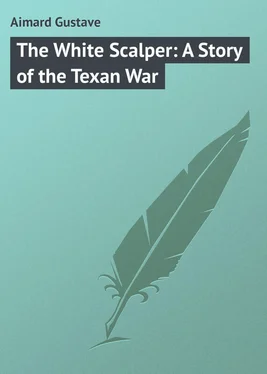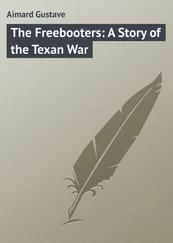Gustave Aimard - The White Scalper - A Story of the Texan War
Здесь есть возможность читать онлайн «Gustave Aimard - The White Scalper - A Story of the Texan War» — ознакомительный отрывок электронной книги совершенно бесплатно, а после прочтения отрывка купить полную версию. В некоторых случаях можно слушать аудио, скачать через торрент в формате fb2 и присутствует краткое содержание. Жанр: foreign_language, foreign_prose, на английском языке. Описание произведения, (предисловие) а так же отзывы посетителей доступны на портале библиотеки ЛибКат.
- Название:The White Scalper: A Story of the Texan War
- Автор:
- Жанр:
- Год:неизвестен
- ISBN:нет данных
- Рейтинг книги:4 / 5. Голосов: 1
-
Избранное:Добавить в избранное
- Отзывы:
-
Ваша оценка:
- 80
- 1
- 2
- 3
- 4
- 5
The White Scalper: A Story of the Texan War: краткое содержание, описание и аннотация
Предлагаем к чтению аннотацию, описание, краткое содержание или предисловие (зависит от того, что написал сам автор книги «The White Scalper: A Story of the Texan War»). Если вы не нашли необходимую информацию о книге — напишите в комментариях, мы постараемся отыскать её.
The White Scalper: A Story of the Texan War — читать онлайн ознакомительный отрывок
Ниже представлен текст книги, разбитый по страницам. Система сохранения места последней прочитанной страницы, позволяет с удобством читать онлайн бесплатно книгу «The White Scalper: A Story of the Texan War», без необходимости каждый раз заново искать на чём Вы остановились. Поставьте закладку, и сможете в любой момент перейти на страницу, на которой закончили чтение.
Интервал:
Закладка:
On the side of a hill that descends in a gentle slope to the river, glisten the white walls of some twenty cottages, with their flat roofs and green shutters, hanging in clusters from the scarped side of the hill, and hidden like timorous birds amid the foliage. These few cottages, built so far from the noise of the world, constitute the rancho of San Isidro.
Unfortunately for the inhabitants of this obscure nook, General Rubio, who felt the necessity of choosing for the site of his camp a strong strategic position, came suddenly to trouble their peace, and recall them rather roughly to the affairs of this world. In fact, from this species of eagles' nests, nothing was easier than for the General to send his columns in all directions. The Mexican army, therefore, marched straight on the rancho of San Isidro, where it arrived about midday. At the unexpected appearance of the troops, the inhabitants were so terrified that, hastily loading themselves with their most valuable articles, they left their houses and fled to hide themselves in the woods.
Whatever efforts the General might make to prevent them, or bring them back to their houses, the poor Indians offered a deaf ear to all, and were resolved not to remain in the vicinity of the troops. The Mexicans therefore remained sole possessors of the rancho, and at once installed themselves in their peaceful conquest, whose appearance was completely changed within a few hours. Tall trees, flowers, and lianas, nothing was respected. Enormous masses of wood lay that same evening on the ground, which they had so long protected with their beneficent shadow. The very birds were constrained to quit their pleasant retreat, to seek a shelter in the neighbouring forest.
When all the approaches to the forest had been cleared for a radius of about twelve hundred yards, the General had the place surrounded by powerful barricades, which transformed the peaceful village into a fortress almost impregnable, with the weak resources the insurgents possessed. The trees on the interior of the rancho were alone left standing, not for the purpose of affording, but to conceal from the enemy the strength of the corps encamped at this spot.
The house of the Indian Alcade, somewhat larger and more comfortably built than the rest, was selected by the General as headquarters. This house stood in the centre of the pueblo; from its azotea the country could be surveyed for a great distance, and no movement in Galveston roads escaped notice. The Texans could not stir without being immediately discovered and signaled by the sentry, whom the General was careful to place in this improvised observatory.
At sunset all the preliminary preparations were finished, and the rancho rendered safe against a coup de main. About seven in the evening the General, after listening to the report of the spies, was sitting in front of the house in the shadow of a magnificent magnolia, whose graceful branches crossed above his head. He was smoking a papillo, while conversing with several of his officers, when an aide-de-camp came up and told him that the person who had come to him that morning from the rebels, earnestly requested the favour of a few minutes' conversation. The General gave an angry start, and was about to refuse, when Colonel Melendez interposed, representing to the General that he could not do so without breaking his word, which he had himself pledged in the morning.
"As it is so," the General said, "let him come."
"Why," the Colonel continued, "refuse to listen to the propositions this man is authorized to offer you?"
"What good is it at this moment? There is always a time to do so if circumstances compel it. Now our situation is excellent; we have not to accept proposals, but, on the contrary, are in a position to impose those that may suit us."
These words were uttered in a tone that compelled the Colonel to silence; he bowed respectfully, and withdrew softly from the circle of officers. At the same moment John Davis arrived, led by the aide-de-camp. The American's face was gloomy and frowning; he saluted the General by raising his hand to his hat, but did not remove it; then he drew himself up haughtily and crossed his hands on his chest. The General regarded him for a moment with repressed curiosity.
"What do you want?" he asked him.
"The fulfilment of your promise," Davis replied drily.
"I do not understand you."
"What do you say? When you made me a prisoner this morning, in contempt of the military code and the laws of nations, did you not tell me that so soon as we reached the mainland, the liberty you had deprived me of by an unworthy abuse of strength, would be immediately restored to me?"
"I did say so," the General answered meekly.
"Well, I demand the fulfilment of that promise; I ought to have left your camp long ago."
"Did you not tell me that you were deputed to me by the rebel army, in order to submit certain propositions?"
"Yes, but you refused to hear me."
"Because the moment was not favourable for such a communication. Imperious duties prevented me then giving your words all the attention that they doubtless deserve."
"Well, and now?"
"Now I am ready to listen to you."
The American looked at the officers that surrounded him.
"Before all these persons?" he asked.
"Why not? These Caballeros belong to the staff of my army, they are as interested as I am in this interview."
"Perhaps so: still, I would observe, General, that it would be better for our discussion to be private."
"I am the sole judge, Señor, of the propriety of my actions. If it please you to be silent, be so; if not, speak, I am listening."
"There is one thing I wish to settle first."
"What is it?"
"Do you regard me as an envoy, or merely as your prisoner?"
"Why this question, whose purport I do not understand?"
"Pardon me, General," he said with an ironical smile, "but you understand me perfectly well, and so do these Caballeros – if a prisoner, you have the right to force silence upon me; as a deputy, on the other hand, I enjoy certain immunities, under, the protection of which I can speak frankly and clearly, and no one can bid me be silent, so long as I do not go beyond the limits of my mission. That is the reason why I wish first to settle my position with you."
"Your position has not changed to my knowledge. You are an envoy of rebels."
"Oh, you recognise it now?"
"I always did so."
"Why did you make me a prisoner, then?"
"You are shifting the question. I explained to you a moment ago, for what reason I was, to my great regret, compelled to defer our interview till a more favourable moment, that is all."
"Very good, I am willing to admit it. Be kind enough, General, to read this letter," he added, as he drew from his pocket a large envelope, which, at a sign from the General, he handed to him.
Night had fallen some time before, and two soldiers brought up torches of acote-wood, which one of the aides-de-camp lit. The General opened the letter and read it attentively, by the ruddy light of the torches. When he had finished reading, he folded up the letter again pensively, and thrust it into the breast of his uniform. There was a moment's silence, which the General at last broke.
"Who is the man who gave you this letter?"
"Did you not read his signature?"
"He may have employed a go-between."
"With me, that is not necessary."
"Then, he is here?"
"I have not to tell you who sent me, but merely discuss with you the proposals contained in the letter."
The General gave a passionate start.
"Reply, Señor, to the questions I do you the honour of asking you," he said, "if you do not wish to have reasons for repenting."
"What is the use of threatening me, General? You will learn nothing from me," he answered firmly.
Читать дальшеИнтервал:
Закладка:
Похожие книги на «The White Scalper: A Story of the Texan War»
Представляем Вашему вниманию похожие книги на «The White Scalper: A Story of the Texan War» списком для выбора. Мы отобрали схожую по названию и смыслу литературу в надежде предоставить читателям больше вариантов отыскать новые, интересные, ещё непрочитанные произведения.
Обсуждение, отзывы о книге «The White Scalper: A Story of the Texan War» и просто собственные мнения читателей. Оставьте ваши комментарии, напишите, что Вы думаете о произведении, его смысле или главных героях. Укажите что конкретно понравилось, а что нет, и почему Вы так считаете.












